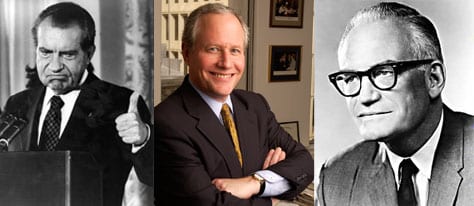In 1964, Barry Goldwater carried just six states running on a platform of constitutionally limited government. If certain provisions of the Civil Rights Act of 1964 were not among the expansions of federal power Goldwater opposed, he likely would have lost five of those states too.
Just eight years later, however, Republican Richard Nixon was reelected to the presidency in a 49-state landslide, after embracing wage and price controls, the Environmental Protection Agency, affirmative action, and Keynesian economics. So this proves that big government is good for Republicans while small government is for losers, right?
Such an argument can only be sustained by ignoring longer-term political context. Goldwater both came from and enhanced a movement that made the Republican Party truly competitive nationally, as opposed to the permanent minority party that could only elect president when nominating a war hero or reacting to Democratic overreach. Nixon’s victory was followed by the overwhelmingly Democratic Watergate Congress after the 1974 elections — and, once designated successor Gerald Ford fell in 1976, unified Democratic control of the federal government.
Watergate — and, in Ford’s case, a poor choice of words concerning the Soviet Union’s position vis-à-vis Poland — had more to do with this than Republican big government, of course. But Republican big government certainly didn’t do anything to help.
Though Nixon deserves considerable credit for bringing the Silent Majority into the GOP electoral coalition, few big-government conservatives hold up his presidency as a boon to the Republican Party. But some members of this seemingly oxymoronic club still want to rehabilitate George W. Bush as an example of how compassionate Toryism is the ticket to electoral success.
Given the results of the last two national elections, this is almost as convincing as the Goldwater-Nixon contrast. With the possible exception of the Bush tax cuts and the president’s SCHIP veto, it is hard to come up with any policy of this administration that was influenced by small-government conservatism. And notwithstanding his commitment to cutting wasteful spending, John McCain’s national greatness philosophy of government makes George W. Bush look like Calvin Coolidge.
Again, the Iraq war and the global financial crisis had more to do with the GOP’s losses over the past two election cycles than big-government Republicanism. But once again, big-government Republicanism certainly didn’t help. The Democrats were able to outbid Republicans on health care despite the Medicare prescription drug benefit, on education despite No Child Left Behind, and most spectacular on recession worries despite the $700 billion bailout plan.
With Republican numbers dipping to pre-1994 levels in both houses of Congress and a Chicago Democrat about to take over the presidency, it is difficult to argue with a straight face that compassionate conservatism will lead to a new GOP majority. Yet that doesn’t stop some people from trying.
Bill Kristol, for example, argued last week in the New York Times that advocating smaller government is the political equivalent of the Charge of the Light Brigade. He points out that Republicans ran into political trouble when their new congressional majority tried to restrain the growth of Medicare spending in 1995. Bush, on the other hand, at least arguably helped himself in 2000 and 2004 by first advocating and then signing an expansion of Medicare to cover prescription drugs.
Leaving aside whether it is truly “successful” government policy to worsen Medicare’s looming insolvency rather than try to alleviate it, this analysis leaves out some important political benchmarks. Despite the backlash against the class of ’94’s Medicare gambit, Republicans continued to control Congress for twelve years afterward. The prescription drug benefit didn’t buy Republicans more than three years in the majority. Newt Gingrich handed over the speaker’s gavel to another Republican; President Bush will be replaced by unified Democratic control of the federal government’s elected branches.
Since World War II, Republicans have seriously tried to cut federal domestic spending exactly three times. They did so most recently during Ronald Reagan’s first two years in office and during the first two years of the Gingrich Congress. Republicans paid a steep political price both times — neither the 1982 nor the 1996 congressional elections were kind to GOP incumbents — but Reagan was reelected and the Gingrich majority still held. (The third group of Republicans who seriously tried to cut spending, the Do-Nothing Congress that stood athwart Harry Truman, didn’t survive though many of their spending cuts did.)
In other words, the Republicans were in better shape after their spending battles than they were after eight years of big-government conservatism under Nixon-Ford or Bush 43. That’s obviously not because the American electorate is comprised of doctrinaire libertarians. It probably has more to do with the fact there already exists a political party willing to satisfy voters’ needs for new government programs. That party is called the Democrats.
























